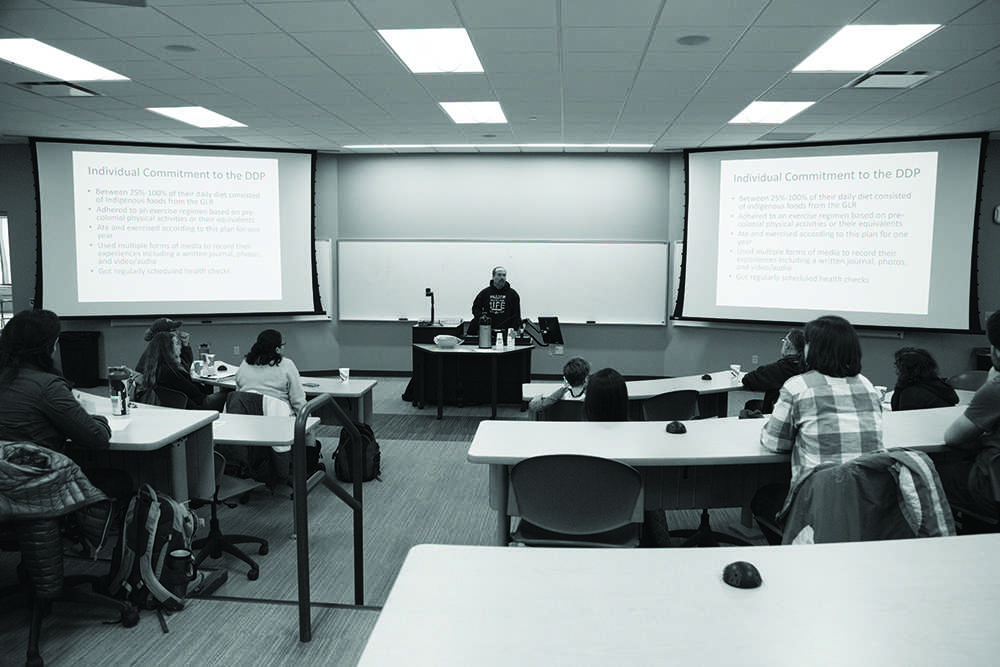Would ancestors recognize the food people eat today? Would people today recognize the food of ages past?
The answer to these questions floated on the aromatic scents wafting from homemade sunbutter cookies and white pine needle tea made from ingredients strictly native to the Great Lakes Region. The traditional Native American food was made by Martin Reinhardt, Ph.D, an NMU associate professor of Native American studies and the principal investigator of the Decolonizing Diet Project (DDP).
“The forces of colonization have forever altered our environment,” Reinhardt said. “Radiation contamination from Fukushima still resides in the soil. Our diet can never truly be decolonized because we are eating in a colonized place.”
Students, faculty and staff comprised the 22 attendees at the “Decolonize Your Diet” event from 5 to 6:30 p.m in room 1320 of Jamrich Hall on April 3. The event was hosted by EcoReps students Mina Stumpfoll, a junior environmental science major, and Bryce DeMers, a junior ecology major.
While preparing food for the First Nations Food Taster event one year, a realization struck Reinhardt: The food that was supposedly representative of his culture of hunters and foragers actually contained minimal traces of what his ancestors originally ate in the Great Lakes Region. Instead, the food was from far off places that would have been unrealistic for his ancestors to access, and thus not included in their pre-colonial diet.
The question of whether his ancestors would recognize his food today, or not, flip-flopped into whether he could recognize theirs, Reinhardt said. The question grew into a research endeavor, and thus came the Decolonizing Diet Project, he explained.
He started planning the DDP in 2010. The first thing Reinhardt had to do was define the area in question. He gave everyone in the Native American studies office a map and asked them to draw a line where the Great Lakes Region was.
“Of course the results were all different. We wanted to be inclusive but also had to draw the line,” Reinhardt said.
He called residents that lived in states within the Great Lakes watersheds and asked if they considered themselves to live in the Great Lakes Region. The consensus was that where tribes once resided and where watersheds existed is where the region would be defined as the Great Lakes, Reinhardt said.
Two years later, the project was implemented with 25 people participating. For a year, Reinhardt and a few other participants followed a strict diet of only ingredients indigenous to the Great Lakes Region. The rest of the people in the study supplemented their diets by eating 25 percent, or less, indigenous food.
“People got really excited early on and started doing their own research,” said Grace Chailler, a contingent associate professor in the Native American studies department.
A colonized diet stripped Native people of nutrients that were prevalent in indigenous food and increased the amount of cholesterol in their diet, which led to health related problems, Reinhardt explained.
“Heart disease and obesity-related issues are killing more Indians than John Wayne,” Reinhardt said.
The DDP measured the participants’ girth, waist diameter, cholesterol, blood glucose levels, obesity, blood pressure and BMI. After a year of eating locally-sourced foods, half of the participants experienced improved health conditions, while the other half remained unchanged. For the most part, Reinhardt found a significant decrease in cholesterol, weight and girth among participants and for himself, he said.
The indigenous food options are extremely limited when compared to those of today’s global, colonized market, he said.
“You can’t go to the supermarket and go down the indigenous food aisle,” Chailler agreed. “You can’t go downtown and see an indigenous food truck.”
Because of this, Reinhardt said he paid high prices and devoted much time to foraging, preparing and storing native foods.
The DDP participants were not dissuaded by the limited availability of indigenous options. They became resourceful. They ground up grasshoppers for spice, used white pine bark and pumpkin seeds as flour and utilized sunflower oil as a fatty base.
For those interested in embarking on a decolonizing diet, Reinhardt urged people to do it for a meaningful reason and to learn how to respectfully forage when in patches of already fragile indigenous ground.
“I spent an additional four hours preparing every day, but it was worth it,” Reinhardt said.
More information on the DDP can be found at decolonizingdietproject.blogspot.com.























